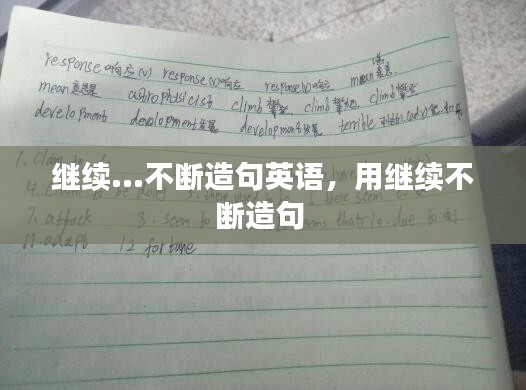Introduction to the Power of "Continue" and "Keep on" in English
English, like any language, is rich with nuances and expressions that can convey a wide range of meanings. Two such expressions that often carry a strong connotation of persistence and determination are "continue" and "keep on." This article delves into the versatility of these phrases and provides a variety of examples to illustrate their usage in different contexts.
Using "Continue" in Academic and Professional Settings
In academic and professional writing, "continue" is often used to indicate a process that is ongoing or expected to continue in the future. Here are a few examples:
1. The research on renewable energy sources will continue for several more years as scientists strive to find more efficient methods.
2. The project will continue to be monitored closely by the project management team to ensure its successful completion.
3. Despite the challenges, the team will continue to work tirelessly to meet the project deadlines.
Expressing Persistence with "Keep on"
"Keep on" is a more colloquial way of expressing the idea of continuing. It's often used in casual conversation or informal writing. Let's look at some examples:
1. Even though the weather was terrible, the runners kept on running until the finish line.
2. She kept on trying to reach her friend, but the phone line was busy.
3. Despite the negative comments, the artist kept on painting, driven by his passion for the craft.
Mixing "Continue" and "Keep on" for Enhanced Effect
Combining these two expressions can create a powerful statement that emphasizes the idea of unwavering commitment. Here are a few examples:
1. The company will continue to keep on innovating and expanding its product line.
2. We must continue to keep on learning and adapting to the changing market conditions.
3. The students will keep on continuing their studies, despite the financial difficulties they face.
Using "Continue" and "Keep on" in Different Tenses
These expressions can be used in various tenses to reflect different stages of an action. Let's explore how they can be used in simple present, present continuous, and future perfect continuous tenses:
Simple Present:
1. The library continues to be a popular spot for students after classes.
2. They keep on working late to complete the report.
Present Continuous:
1. We are continuing to improve our customer service.
2. She is keeping on trying to find a solution to the problem.
Future Perfect Continuous:
1. By next year, they will have continued to work on the project for over five years.
2. By the time we arrive, they will have kept on traveling for hours.
Conclusion
"Continue" and "keep on" are versatile English phrases that effectively convey the concept of ongoing action and persistence. Whether used in formal or informal contexts, these expressions can add depth and clarity to your communication. By understanding their various uses and tenses, you can enrich your vocabulary and express your ideas more precisely.
转载请注明来自眉山市东坡区麦冬冬商行,本文标题:《继续...不断造句英语,用继续不断造句 》













 蜀ICP备2022005971号-1
蜀ICP备2022005971号-1
还没有评论,来说两句吧...